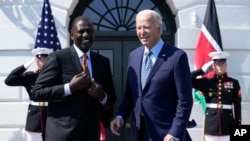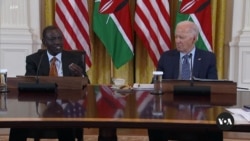President Joe Biden said Thursday that he would designate Kenya as the first major non-NATO U.S. ally in sub-Saharan Africa, as he welcomed President William Ruto for the first state visit to the U.S. by an African leader in nearly 16 years.
The significant strategic move signals the shifting of U.S. security cooperation to East Africa just as U.S. troops prepare to depart Niger, leaving a vacuum that Russian forces have begun to fill.
The designation gives nonmembers of the North Atlantic Treaty Organization access to military and financial advantages that NATO members enjoy, but without the mutual defense agreement that holds NATO together.
A senior administration official told reporters late Wednesday that Biden would inform Congress of the designation, which takes 30 days to take effect.
Biden, during a day full of meetings with Ruto – capped with a glitzy, 500-guest state dinner attended by former Presidents Barack Obama and Bill Clinton and former Secretary of State Hillary Clinton – said this new designation is a result of the close collaboration between the two nations on fighting terrorism in the volatile Horn of Africa.
"That's a fulfillment of years of collaboration on joint counterterrorism operations that degraded ISIS and al-Shabab across East Africa, our mutual support for Ukraine and rallying the world to stand behind the U.N. Charter, and our work together on Haiti is helping pave the way to reduce instability and insecurity," Biden said.
But analysts said Kenya’s spotty human rights record – as amply documented by the U.S. State Department – raised concerns about how it will use its new privileged status.
"Kenya has serious issues with things like extrajudicial killings and forced disappearances and torture and cruel and inhumane and other forms of degrading punishment by government or on behalf of the government," said Michael Walsh, a senior fellow in the Africa Program at the Foreign Policy Research Institute.
"And this is by the security forces. So there's going to be concerns that that part of the strategy is being abandoned, that the U.S. is no longer putting such a priority on democracy promotion in Africa and the U.S. is really retrenching toward the security side of the security-democracy paradigm," Walsh added.
Ruto and Biden used their daylong deliberations to iron out Kenya’s plan to send 1,000 security officers to the fragile, chaotic Caribbean nation of Haiti.
The initiative, to which the United States has pledged $300 million in support, faces stiff political and legal challenges in Kenya. The mission was also delayed when Haitian armed gangs took control while the nation’s leader, Ariel Henry, was visiting Kenya in March. He resigned in April and has not returned to the island.
Ruto, who said he was "looking forward" to the deployment of forces to Haiti, did not give a date or further details.
And the White House on Thursday also rolled out a number of security-related agreements, which included training opportunities and military exercises, assistance in managing refugees, U.S. investments in Kenya’s security sector counterterrorism efforts, including increased information sharing as well as 16 helicopters and 150 armored vehicles.
From bombs to bonbons
Washington also made millions of dollars of commitments toward efforts the U.S. sees as key to development. Those include areas such as democracy, health, education, arts and culture, climate management, trade, technology, and the one item Ruto said was his main priority on his four-day swing through the United States: work to restructure African nations’ crippling debt to the world’s largest creditor, China.
Ruto on Thursday reiterated his plea that the U.S. double its commitments to help restructure African nations’ debts – and warned of steep consequences otherwise.
"Unless this is done, and done immediately, the values of freedom, democracy and the rule of law are in great jeopardy," he said.
The lengthy list of American pledges did not include the roads, bridges and railroad projects that African leaders have long said they need to keep up with their exploding populations. For those, they turn to China’s sprawling Belt and Road Initiative, which counts the African continent as the largest beneficiary of its massive $1 trillion global project.
This, analysts say, represents Africa’s new stance as its young democracies mature, less than a century after liberation from colonialism: In a world of competition among the world’s great powers, they want to be somewhere in the middle.
"I think many U.S. officials see this very much as a zero-sum game in this kind of great power competition to gain influence," said Cameron Hudson, a senior fellow in the Africa Program at the Center for Strategic and International Studies.
"African countries don't see it that way," he said. "They actually see the benefit of being able to partner with China on trade, with Russia on security and with Washington on development, and they don't see any inconsistency in that approach."
"And I think unless and until Washington becomes much more comfortable with seeing their privileged relationships become partnerized with other countries, I think it's going to be very difficult for Washington to really chart a course forward with many of these countries," he said.
This was the first White House state visit by an African leader in nearly 16 years, and that significance was not lost on first lady Jill Biden, who, ahead of her sixth state dinner, spoke of a glass-ceilinged pavilion set under the stars, of a gospel choir and shag carpets and "the glow of candles in a space saturated with warm pinks and reds."
White House executive chef Cristeta Comerford narrated a menu of chilled green tomato soup touched with sweet onions and drizzled with white balsamic vinegar and fine Californian olive oil, of butter-poached lobster and seasonal bounties reminiscent of American summer. She lavished words on the bed of kale and roasted corn and corn puree and roasted turnips and sweet potatoes and squash but touched just briefly on the one item that is seen as a hallmark of a fine Kenyan feast:
"Red meat," she said.
Specifically, she said, they are marinated and smoked short ribs, perched atop that farmers market's worth of produce.
Guests arriving at the dinner said they were full of hope for the continent's future.
Dr. John Nkengasong, Biden's Global AIDS coordinator, told VOA he wants to see the now 21-year-old PEPFAR program to combat HIV "renewed in a clean manner."
"We are committed to staying focused until we bring HIV/AIDS under control by the year 2030," he said.
Audrey Azoulay, head of the United Nations Educational, Scientific and Cultural Organization, said the continent has made a "major" contribution to the arts.
"One important thing is now to recognize it," she told VOA. "If you think about music, if you think about fabrics, fashion, world heritage sites that are designated by UNESCO. We made it a priority now to better recognize this heritage."
National Basketball Association head Adam Silver told VOA he was thrilled about the continent's new Basketball Africa League.
"Basketball's really picking up across the continent," he said.
Some seemed less hopeful about politics at home.
Guest LeVar Burton, the actor and host of the popular educational show Reading Rainbow, paused when asked by reporters what he thought the word of the day was to describe the nation's political climate.
"Just one?" he said. "Can I swear?"
After some thought, he replied: "Fraught. With possibility. That's three words."
Also at the dinner was American writer Barbara Kingsolver, author of the ambitious, searing novel The Poisonwood Bible, which uses multiple narrators to trace a family's travails through the newly independent Democratic Republic of Congo. VOA asked the author what inspires her about Africa.
"Everything," she replied.
VOA’s Kim Lewis contributed to this report from Washington.






